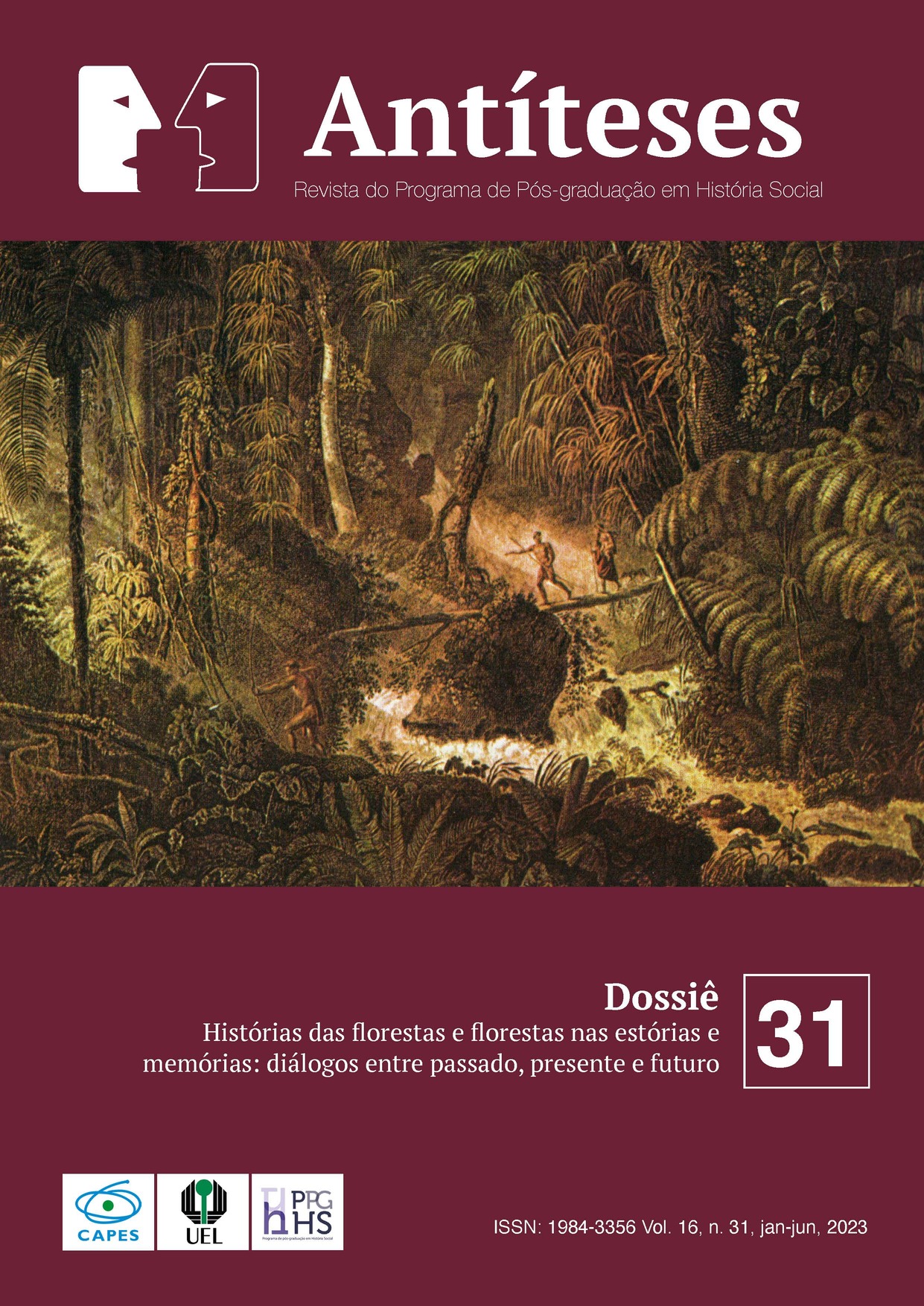Narrativas de ordem global e reordenação do Sul Global
DOI:
https://doi.org/10.5433/1984-3356.2023v16n31p292-325Palavras-chave:
Narrativas, Ordem, Reordenação, Sul Global, RI GlobalResumo
A ordem global está mudando de um mundo unipolar dominado pelo Ocidente para um mundo multipolar, com a Ásia emergindo como um importante centro de gravidade. As narrativas de ordem e reordenação são ferramentas poderosas que moldam as agendas políticas e permitem que os atores locais, nacionais e globais considerem as ordens contemporâneas ou históricas ou as mudanças nessas ordens. Essas narrativas, provenientes do Norte Global, dominaram os campos das ciências sociais, como as Relações Internacionais (RI). As narrativas de ordem do Sul Global têm recebido muito menos atenção acadêmica. Este artigo contribui para preencher essa lacuna ao examinar as narrativas de ordem global e reordenação de atores estatais e não estatais no Mashreq, na Índia, no Magrebe (com foco no Marrocos) e no Irã. Os casos estudados oferecem uma gama diversificada de narrativas para análise interdisciplinar, destacando a importância de compreender as narrativas globais a partir de perspectivas não ocidentais. Fazer um balanço de tais perspectivas em análises políticas e acadêmicas é essencial para o pluralismo metodológico, conceitual e teórico nas Ciências Sociais, em geral, e para a tarefa de globalizar o campo das RI, em particular.
Downloads
Referências
ABRAHAM, Itty. From Bandung to NAM: non-alignment and Indian foreign policy, 1947-65. Commonwealth & Comparative Politics, London, v. 46, n. 2, p. 195-219, 2008.
ARRIGHI, Giovanni. The long twentieth century: Money, power, and the origins of our times. London: Verso, 1994.
BASRUR, Rajesh. Modi's Foreign Policy Fundamentals: A Trajectory Unchanged. International Affairs, Oxford, v. 93, n. 1, p. 7-26, 2017.
BOUAZIZ, Mohamed. Al-yasÄr al-maÄ¡riby al-ǧadyd: al-našʾa wa al-masÄr: (1965-1979). The Moroccan New Left: Birth and trajectory: (1965-1979). [S. l.]: Dar Tinmel, 1993.
BROWN, L. Carl. International Politics and the Middle East: old rules, dangerous game. Princeton: Princeton University Press, 1984.
CHACKO, Priya. Indian foreign policy: The politics of postcolonial identity from 1947 to 2004. New York: Routledge, 2012.
CHATTERJEE, Shibashis; DAS, Udayan. India's Civilizational Arguments in South Asia: From Nehruvianism to Hindutva. International Affairs, Oxford, v. 99, n. 2, p. 475-494, 2023.
CORDIER, Bruno. The Economic Cooperation Organization: towards a new silk road on the ruins of the Cold War? Central Asian Survey, London, v. 15, n. 1, p. 47-57, 1996.
DIETRICH, Christopher. R. W. Oil revolution: Anticolonial Elites, Sovereign Rights, and the Economic Culture of Decolonization Global and International History. Cambridge: Cambridge University Press, 2017.
EL AYADI, Mohammed. Les deux visages du roi: le monarque et le Commandeur des Croyants. Casablanca: Editions la Croisée des Chemins, 2015.
FISHER-ONAR, Nora; KAVALSKI, Emilian. From Trans-Atlantic Order to Afro-Eur-Asian Worlds? Reimagining International Relations as Interlocking Regional Worlds. Global Studies Quarterly, Oxford, v. 2, n. 4, p. 1-11, 2022.
FOROUGH, Mohammadbagher. Intervention with Chinese characteristics: the Belt and Road Initiative reconfiguring (Afro-) Eurasian geo-economics. Conflict, Security & Development, London, v. 19, n. 3, p. 275-281, 2019.
FOROUGH, Mohammadbagher. Iranian Strategic Culture and "Ways of War": The Role of Local Concepts and Narratives of "Game" and "Play". International Journal of Persian Literature, United States, v. 6, n. 1, p. 120-142, 2021a.
FOROUGH, Mohammadbagher. Raisi's Foreign Policy: Pragmatic Revolutionism and the Iranian Pivot to Asia. Hamburg: German Institute for Global and Area Studies, 2021b.
FOROUGH, Mohammadbagher. Geographic Agency: Iran as a "Civilizational Crossroads" in the Belt and Road Geography. In: SCNEIDER, Florian (ed). Global perspectives on China's Belt and road initiative: asserting agency through regional connectivity. Amsterdam: Amsterdam University Press, 2021c. p. 291-313.
FOROUGH, Mohammadbagher. The Production of Souls in International Relations. Global Studies Quarterly, Oxford, v. 2, n. 4, p. 1-13, 2022.
GANGULY, Sumit. India's foreign policy grows up. World Policy Journal, Durham, v. 20, n. 4, p. 41-47, 2003.
GANGULY, Sumit. India in the Liberal Order. In: FLOCKHART, Trine; KUPCHAN, Charles A.; LIN, Christina; NOWAK, Bartlomiej E.; QUIRK, Patrick W.; XIANG, Lanxin (ed.). Liberal order in a Post-Western World. Washington: German Marshall Fund of the United States, 2014. p. 83-94.
GAUSE, Gregory F. Saudi Arabia and Regional Leadership: The Impossibility of Hegemony. Middle East Insights, Singapore, n. 243, p. 1-6, Aug. 2020. Disponível em: https://mei.nus.edu.sg/wp-content/uploads/2020/08/Insight-243-F-Gregory-Gause-III-1.pdf. Acesso em: 14 fev. 2023.
GNOLI, Gherardo. The idea of Iran: an essay on its origin. [Los Angeles]: Universidade da Califórnia, 1989. Serie Orientale Roma, v. 62.
HALL, Ian. Modi and the reinvention of Indian foreign policy. Bristol: Bristol University Press, 2019.
HALLIDAY, Fred. The Middle East in international relations: power, politics and ideology. Cambridge. New York: Cambridge University Press, 2005. v. 4.
HAMPSON, Fen Osler; NARLIKAR, Amrita. Narratives, Political Identity, and International Negotiation. In: HAMPSON, Fen Osler; NARLIKAR, Amrita (ed.). International negotiation and political narratives: a comparative study. London: Routledge, 2022. p. 3-24.
HARMON, William. A handbook to literature. New York: Longman, 2012.
HARSHE, Rajen. "India's non-alignment: an attempt at conceptual reconstruction." Economic and Political Weekly (1990): 399-405.
HILALI, Fouad. Min waṯÄʾiq al-ẖilÄf dÄẖil al-mounaẓama al-marksiyya al-linyniya al-maÄ¡ribiyya "ʾila l-ʾamÄm": jamÄÊ¿at naẓaryyat al-Ê¿awÄlim al-ṯalÄt: min al-marksiyya-allinyniyya ʾila-attaḥryfiyya al-ddenÄ¡syawbiyyaManshurat mawqi' "30 ghust". [S. l.: s. n.], 2016. Disponível em: http://www.30aout.info/media/02/02/1457771751. pdf. Acesso em: 23 mar. 2022.
HINNEBUSCH, Raymond. The international politics of the Middle East. Manchester: Manchester University Press, 2015.
HOBBES, Thomas. Leviathan, 1651. Peterborough: Broadview Press, 1969.
ILA AL-AMAM. . Al-Thawrah fi al-gharb al-'arabi fi al-marhalah al-tarikhiyyah min tasfiyah al-imperiyaliyyah [The revolution in the Arab West in the historical stage of imperisalism's liquidation ].ʾilÄ al-ʾamÄm, , 1971. Disponível em: <http://www.30aout.info/media/02/00/1867347149.pdf>. Acesso em: 29 ago. 2022.
ILA AL-AMAM. . Linabny alḥizb alṯawry taḥta nyrÄn alÊ¿aduw [Let us build the party under enemy fire].ʾilÄ al-ʾamÄm, , 1973. . Disponível em: <http://www.ahewar.org/debat/show.art.asp?aid=5543>. Acesso em: 29 ago. 2022.
ILA AL-AMAM. Min ʾaǧli ẖaá¹á¹ mÄrksy-lynyny liḥizb al-brÅ«lytÄryÄ al-maÄ¡riby Ù€ niqÄÅ¡ munaẓamatinÄ maÊ¿a al-faá¹£yl al-ṯÄliṯ [For a Marxist Leninist Line in the Moroccan Proletarian Party: Our Organisation's discussion with the Third Faction], 1974. . Disponível em: <http://www.30aout.info/من-أجل-خط-ماركسي-لينيني-Ù„Øزب-البروليتاريا-المغربي-Ù€-نقاش-منظ.html>. Acesso em: 19 ago. 2022.
INDIA. Ministry of External Affairs. Panscheel. New Delhi: External Publicity Division, 2004. Disponível em: https://www.mea.gov.in/Uploads/PublicationDocs/191_panchsheel.pdf. Acesso em: 14 fev. 2023.
INDIA will never be a part of an alliance system, says External Affairs Minister Jaishankar. The Hindu, Tamil Nadu, 20 jul. 2020. Disponível em: https://www.thehindu.com/news/national/india-has-never-been-part-of-an-alliance-and-will-never-be-jaishankar/article32142128.ece. Acesso em: 14 fev. 2023.
INDIA'S response to Russia's War in Ukraine Hold Your Fire!. [S. l.], 5 jul. 2022. Disponível em: https://www.crisisgroup.org/asia/south-asia/india/indias-response-russias-war-ukraine. Acesso em: 14 fev. 2023.
ISSAWI, Charles. An economic history of the Middle East and North Africa. New York: Colombia University Press, 1982.
JACOB, Happymon. A New Delhi View on the World Order. Institut Montaigne, 6 out. 2022. Disponível em: https://www.institutmontaigne.org/en/analysis/new-delhi-view-world-order. Acesso em: 14 fev. 2023.
KEENLEYSIDE, T. A. Prelude to power: The meaning of non-alignment before Indian independence. Pacific Affairs, Canada, v. 53, p. 461-483, 1980.
KEPEL, Gilles. (2002). Jihad: The trail of political Islam. Cambridge, MA: Harvard University Press.
KERR, Malcon, H. The Arab cold war: gamal ʼabd al-nasir and his rivals, 1958-1970. London; Oxford University Press, 1971. v. 358
KESSLER, Glenn. Analysis Kerry's claim that Iran offered bush a nuclear deal in 2003. Washington Post, 7 dez. 2021. Disponível em: https://www.washingtonpost.com/news/fact-checker/wp/2013/12/09/kerrys-claim-that-iran-offered-bush-a-nuclear-deal-in-2003/. Acesso em: 14 fev. 2023.
KHILNANI, Sunil. The idea of India. Penguin: London, 1999.
KIENLE, Eberhard. Ba'th v. Ba'th: the conflict between Syria and Iraq 1968-1989. New York: I. B. Tauris, 1990.
KREBS, Ronald. R. How Dominant Narratives Rise and Fall: Military Conflict, Politics, and the
Cold War Consensus. International Organization, Cambridge, v. 69, n. 4, p. 809-845, 2015.
LEIRA, Halvard; CARVALHO, Benjamin. Construction time again: history in constructivist IR scholarship. European Review of International Studies, [s. l.], v. 3, n. 3, p. 99-111, 2016.
MEARSHEIMER, John J. Bound to fail: The rise and fall of the liberal international order. International Security, Massachusetts, v. 43, n. 4, p. 7-50, 2019.
MITCHELL, Richard. P. The society of the Muslim Brothers. Oxford: Oxford University Press, 1993.
MOHAN, C. Raja. Crossing the Rubicon: The Shaping of India's New Foreign Policy. London: Palgrave Macmillan, 2004.
MUKHERJEE, Rohan. Chaos as opportunity: the United States and world order in India's grand strategy. Contemporary Politics, [London], v. 26, n. 4, p. 420-438, 2020.
NARLIKAR, Amrita. India's foreign economic policy under Modi: negotiations and narratives in the WTO and Beyond. International Politics, Syracuse, v. 59, n. 1, p. 148-166, 2022.
NARLIKAR, Amrita. Poverty narratives and power paradoxes in international trade negotiations and beyond. Cambridge: Cambridge University Press, 2020.
NARLIKAR, Amrita. Emerging narratives and the future of multilateralism. In: SARAN, Samir; JOHN, P. Lourdes (ed.). Raisina Files 2021: A Viral World: Can We Respond?. New Delhi: Observer Research Foundation, 2021. p. 12-24.
NORDBRUCH, Götz. Nazism in Syria and Lebanon: The ambivalence of the German option, 1933-1945. London: Routledge, 2011.
OSIANDER, Andreas. Sovereignty, international relations, and the Westphalian myth. International Organization, Cambridge, v. 55, n. 2, p. 251-287, 2001.
ROUHANI, Hassan. Full text of Iran's President Rouhani Speech at UNGA 73. The Iran Project, [S. l.], 25 Sept. 2018. Disponível em: https://theiranproject.com/blog/2018/09/25/full-text-of-irans-president-rouhani-speech-at-unga-73/. Acesso em: 14 fev. 2023.
SAREEN, Sushant. India as the fulcrum in a Cold War 2.0ORF. Observer Research Foundation, New Delhi, 15 Jul. 2020 Disponível em: https://www.orfonline.org/expert-speak/india-as-the-fulcrum-in-a-cold-war-2-0/. Acesso em: 14 fev. 2023.
SPEAR, Thomas George Percival. The Oxford history of modern India: 1740-1975. Oxford: Oxford University Press, 1978.
SRIVASTAVA, Jayati. The Narratives and Aesthetics of the Civilizational State in the 'New' India. International Affairs, Oxford, v. 99, n. 2, p. 457-474, 2023.
STEELE, Robert. The Shah's imperial celebrations of 1971: nationalism, culture and politics in late Pahlavi Iran. London: IB Tauris, 2020.
SUGANAMI, Hidemi. Narrative explanation and international relations: Back to basics. Millennium, London, v. 37, n. 2, p. 327-356, 2008.
TELLIS, Ashley J. "What is in our interest": India and the Ukraine War. Carnegie Endowment for International Peace, Washington, 25 Apr. 2022. Disponível em: https://carnegieendowment.org/2022/04/25/what-is-in-our-interest-india-and-ukraine-war-pub-86961. Acesso em: 25 jan. 2023.
THAKUR, Vineet. Postscripts on Independence: Foreign policy ideas, identity, and institutions in India and South Africa. New Dehli: Oxford University Press, 2019.
TIBI, Bassam. Arab nationalism: a critical enquiry. 2nd. ed. Houndmills: Macmillan, 1990.
UPADHYAYA, Priyankar. Nonaligned states and India's international conflicts. New Delhi: Jawaharlal Nehru University Press, 1987.
VITALIS, Robert. America's kingdom: Mythmaking on the Saudi oil frontier. California: Stanford University Press, 2007.
WATERBURY, John. Nasser and Sadat: The political economy of two regimes. Princeton: Princeton University Press, 1983.
WEIL, Simone. The need for roots: Prelude to a declaration of duties towards mankind. London: Routledge, 2003.
WIMMER, Andreas; SCHILLER, Glick Nina. Methodological Nationalism and Beyond: Nation-State Building, Migration and the Social Sciences. Global Networks, [S. l.], v. 2, n. 4, p. 301-334, out. 2002.
WOERTZ, Eckart. Oil for food: The Global Food Crisis and the Middle East. Oxford: Oxford University Press, 2013
WOJCZEWSKI, Thorsten. Identity and world order in India's post-Cold War foreign policy discourse. Third World Quarterly, London, v. 40, n. 1, p. 180-198, 2019.
WOLFE-HUNNICUTT, Brandon. The Paranoid Style in American diplomacy: Oil and Arab Nationalism in Iraq. Stanford: Stanford University Press, 2021.
YERGIN, Daniel. The prize: The epic quest for oil, money & power. New York: Simon and Schuster, 2011.
ZARIF, Javad. Doraan-e Gozaar dar Ravaabete Beinolmelal dar Donyaaye Pasaagharbi [The transition in international relations of the post-Western world]. Tehran: Center for International Research and Education, 2016.
Downloads
Publicado
Como Citar
Edição
Seção
Licença
Copyright (c) 2023 Mohammadbagher Forough, Khalil Dahbi, Alex Waterman, Eckart Woertz

Este trabalho está licenciado sob uma licença Creative Commons Attribution 4.0 International License.
A Revista Antíteses adota a Licença Creative Commons Attribution 4.0 International, portanto, os direitos autorais relativos aos artigos publicados são do(s) autor (es), que cedem à Revista Antíteses o direito de exclusividade de primeira publicação.
Sob essa licença é possível: Compartilhar - copiar e redistribuir o material em qualquer suporte ou formato. Adaptar - remixar, transformar, e criar a partir do material, atribuindo o devido crédito.
https://creativecommons.org/licenses/by/4.0/












